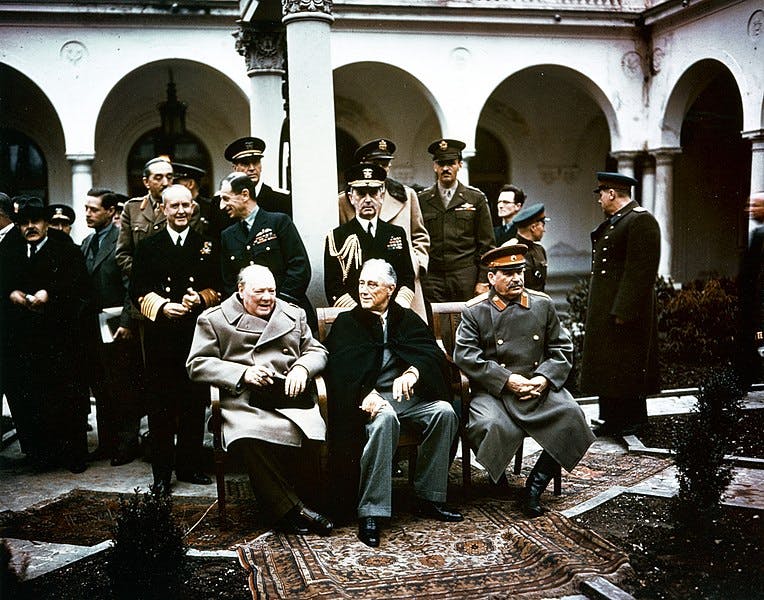What Would Churchill Have Said About the State of the Ukraine War?
He famously pointed to the ‘end of the beginning’ of the war he eventually helped win, but it is too early to be sure we are even at that point as the long-awaited Ukrainian counteroffensive appears to be under way.

Whether this week’s apparent escalation in the Ukraine war is a Churchillian “end of the beginning” or we are far from that point could determine the outcome of the most consequential European war since the 1940s.
Fog of war makes it difficult to determine whether reported Ukrainian assaults on Russian positions are part of a much-awaited spring counteroffensive. While Moscow boasts of thwarting Ukrainian attempts at retaking territory in Donetsk, in the east of the country, Kyiv officials are mostly mum.
Since last winter Kyiv officials have both talked up and lowered expectations over the prospects of a spring counteroffensive. Widely described as a military effort to retake territories in the east and south of the country, Westerners have picked up the theme, expecting a decisive battle to determine the outcome of the war. The spring offensive figured high in debates over the level of NATO support needed to assure Ukraine’s victory.
Whenever Kyiv decides to launch an offensive, President Biden “is confident that we did everything we could over the last six, eight months, or more to make sure that they have all the equipment, the training, the capabilities to be successful,” the national security council’s spokesman, John Kirby, said Monday when asked if the spring offensive is already here.
“It’s always spring somewhere in the world,” Ukraine’s ambassador at the United Nations, Sergiy Kylystya, told the Sun coyly last month, when asked when the offensive would start. Over the weekend President Zelensky inched closer to confirming that the assault is imminent. “We are ready,” he told the Wall Street Journal on Saturday.
Yet, the outgoing chairman of the Joint Chiefs of Staff, General Mark Milley, said last week that while training sessions on Abrams tanks and F-16 fighter jets are ongoing, they are unlikely to be completed in time for “Kyiv’s imminent counteroffensive.”
As the official start of summer nears, Moscow is claiming the Ukrainian spring assault is already failing. On Sunday, “the enemy launched a large-scale offensive in five sectors of the front in the South Donetsk direction,” the Russian defense ministry said in a statement posted on Telegram. “The enemy did not achieve its tasks, it had no success.”
The Wagner mercenary army’s chief, Yevgeny Prigozhin, who has been at odds with the defense ministry, was less rosy about the tide of war, saying that Ukrainian forces took over a town just north of Bakhmut. Shortly after announcing last month that his troops have completed capturing Bakhmut, Mr. Prigozhin said Wagner would withdraw, and hand it over to the Russian army.
Ukrainian troops are “moving forward” toward Bakhmut, Kyiv’s ground forces commander, Oleksandr Syrskyi, confirmed Monday. Other Ukrainian military officials denied Mosccow’s boast of a failed Ukrainian attempt at Donetsk, talking up success at Bakhmut.
The Russians are “making things up,” an adviser to the Kyiv defense ministry, Yuriy Sak, told the BBC Monday. “What we are seeing right now is the intensification of psy-ops and disinformation campaigns.”
Both sides seem to appeal to domestic audiences, as well as to outside supporters. During the winter America and NATO have raised expectations over the spring counteroffensive. If decisive victory in that assault fails to materialize, they may turn their backs on Kyiv, supporters fear.
“Putting all our eggs in the spring offensive basket is a big mistake,” the editor of the Long War Journal, Bill Roggio, tells the Sun. While Americans and others have provided arms to the Ukrainian military, Mr. Roggio notes, training on these weapon systems lags.
“Everyone recognizes Ukraine needs a modernized air force,” Mr. Milley said last week, adding however that training the Ukrainians is “going to take a considerable amount of time.”
CNN is reporting that Kyiv, meanwhile, is cultivating “a network of agents and sympathizers inside Russia working to carry out acts of sabotage against Russian targets.” A recent drone attack has knocked off the Russian flag from atop the Kremlin. Repeated attacks on the west Russian region of Belgorod further raise Washington’s fears of a widening war that could drag in America.
Such fears could erode public support for the war, especially if it continues with no prospect of victory in sight. “I don’t know how long it will take,” Mr. Zelensky told the Journal. “To be honest, it can go a variety of ways, completely different. But we are going to do it, and we are ready.”
Yet, to maintain Western support, Ukrainian forces will need to significantly break the stalemate on the battlefield, which is widely considered to Russia’s advantage.
As the tide started turning three years into World War II, Churchill famously said, “Now this is not the end. It is not even the beginning of the end. But it is, perhaps, the end of the beginning.” Looking back, his inkling that the war could be won was prescient. This spring, such an outcome is far from assured in Ukraine.
_________
Correction: The Yalta Conference, referenced in the cutline of the illustration for this story, took place in 1945. The year was misstated in the bulldog.

